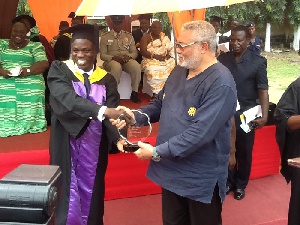Private tertiary institutions have been challenged to offer relevant training that offer job opportunities to enable their graduates to effectively utilise their training.
That, according to Dr. Esther Ofei Aboagye, Deputy Chairperson of the National Development Planning Commission (NDPC), would help to effectively address the graduate unemployment rate, adding that schools need to equally focus on creating employment avenues for students.
“Private tertiary institutions must take bold and innovative steps to help in addressing the unemployment menace,” she said, stressing that the schools should not be only interested in admitting and churning out graduates.
Dr. Offei-Aboagye said this at the fifth congregation ceremony of the KAAF University College in Kasoa-Buduburam, in the Central Region, on the theme “Enhancing graduate employment through quality tertiary education: the role of private universities in Ghana.”
Explaining the key role private institutions could play in creating jobs, she indicated that they must collaborate with the private sector such that even before students complete their courses, they could easily be absorbed into the labour system.
“Private tertiary institutions whatever the reasons that motivated their establishments have certain strengths that can contribute to creating that ethos of optimising the resources that are available,” she said.
Dr. Ofei-Aboagye noted that reliable research findings and policy reviews have largely been produced by public universities, and that the absence of private institutions can be rectified by requiring their staff to research and publish more rigorously.
She urged tertiary institutions to adhere to quality standards which should not be compromised in the quest to increase admissions, adding that “with the proliferation of courses in tertiary education, it is important that we don’t lose sight of quality.”
She said Ghana classified as a middle income country needed to develop the infrastructure and characteristics that match and optimise the opportunities that the status offers.
She commended the school for its philosophy of seeking to change society through teaching, research and promoting the exchange of ideas.
A total of 186 students graduated with degrees in the field of civil engineering, geometric engineering, construction technology, marketing, banking and finance, accounting, human resource management and entrepreneurship.
Dr. Fredrick Yaw Addo-Abedi, Rector of KAAF University, in his report, said the school was planning to roll out graduate programmes, starting with Master of Science in Highway Engineering.
He noted that the university seeks to contribute to solve the growing problem of graduate unemployment by introducing a seminar course in entrepreneurship to be subscribed by all students who enroll at KAAF University.
“We would nevertheless like to call for a national debate on finding ways to reduce graduate unemployment as a way of harnessing the human potential embedded in these graduates for national development,” he said.
He advised the graduates to be agents of positive change in their communities and fiercely guard their integrity with the knowledge acquired.
General News of Wednesday, 19 October 2016
Source: ghanaiantimes.com.gh













